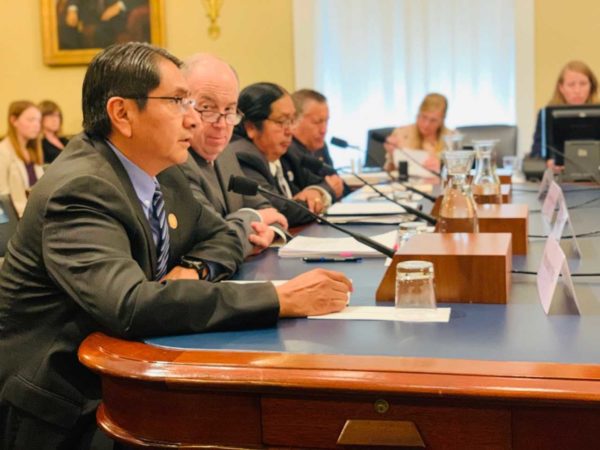
- Details
- By Native News Online Staff
WASHINGTON — Leaders of the Navajo Nation are applauding the passage by the U.S. Senate of the Navajo Utah Water Rights Settlement Act. If enacted into law, it would settle decades-long negotiation between the Navajo Nation, federal government and the State of Utah.
“Providing clean water for the Navajo people is a challenging task and we have worked with our friends in Congress and across the country to move this important measure forward. As the Navajo Nation continues to struggle to address COVID-19, we welcome the passage by the United States Senate of the Navajo Utah Water Rights Settlement Act, which would provide desperately needed funding for clean drinking water to our members,” Navajo Nation President Jonathan Nez said in a statement.
The settlement would provide running water to the 5,000 Navajo citizens who live in Utah that is part of the Navajo Indian Reservation. Currently, only 40 percent of the residents currently have running water.
“On behalf of the 24th Navajo Nation Council, I want to thank our U.S. Senators for approving the long-awaited Navajo Utah Water Rights Settlement Act today. This is a momentous day, and we must thank, first and foremost, the Navajo advocates and leaders that came before us who worked to make this day possible,” 24th Navajo Nation Council Speaker Seth Damon said.
The lack of running water and proper sanitation on the Navajo Indian Reservation has been highlighted in the national media during the COVID-19 pandemic that has hit the Navajo Nation hard. As of Monday night, there were 6,110 positive cases of the COVID-19 and 277 related deaths on America’s largest reservation that covers portions of Arizona, New Mexico and Utah.
Introduced by Sen. Mitt Romney (R-UT), Martha McSally (R-AZ), and Kyrsten Sinema (D-AZ), S. 1207, was passed by unanimous consent and now moves to the House of Representatives that requires approval of H.R. 644, a bill sponsored by Rep. Rob Bishop (R-UT).
The Navajo-Utah Water Rights Settlement Act authorizes $198.3 million for the establishment of a water development fund of which $11 million is to be used for operations, maintenance, and repair of approved water development projects for the Navajo Nation. An allocation of 81,500 acre-feet per year of water from the San Juan River in Utah is also included in the act.
Sen. Romney said the legislation was in the making for a very long time and was proud the Senate came together to take it to the finish line.
“The COVID-19 pandemic has disproportionately impacted the Navajo Nation in our state, and the shortage of running water in nearly half of homes is contributing to the spread. With this legislation, we will be able to provide access to water and wastewater facilities for the Navajo Nation and also provide the long-needed water infrastructure for its citizens. I urge my House colleagues to pass this without delay so we can keep the longstanding promise by the federal government to the Navajo Nation in Utah,” Romney said.
More Stories Like This
Native News Weekly (August 25, 2024): D.C. BriefsDeb Haaland Earns Endorsement From Communications Workers of America Local 7076
University Soccer Standout Leads by Example
Two Native Americans Named to Democratic Congressional Campaign Committee's“Red to Blue” Program
Cheyenne River Youth Project Hosts Young Women’s Winter Camp as Part of Lakota Culture Internship
Help us defend tribal sovereignty.
At Native News Online, our mission is rooted in telling the stories that strengthen sovereignty and uplift Indigenous voices — not just at year’s end, but every single day.
Because of your generosity last year, we were able to keep our reporters on the ground in tribal communities, at national gatherings and in the halls of Congress — covering the issues that matter most to Indian Country: sovereignty, culture, education, health and economic opportunity.
That support sustained us through a tough year in 2025. Now, as we look to the year ahead, we need your help right now to ensure warrior journalism remains strong — reporting that defends tribal sovereignty, amplifies Native truth, and holds power accountable.
 The stakes couldn't be higher. Your support keeps Native voices heard, Native stories told and Native sovereignty defended.
The stakes couldn't be higher. Your support keeps Native voices heard, Native stories told and Native sovereignty defended.
Stand with Warrior Journalism today.
Levi Rickert (Potawatomi), Editor & Publisher

